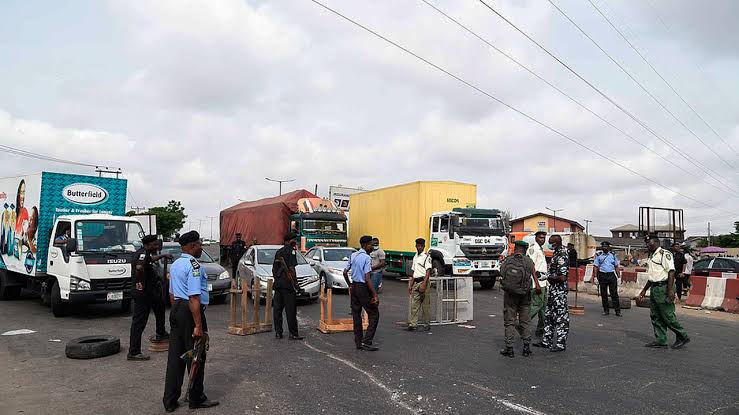Reporter’s Diary: Insecurity Not A Concern At Checkpoints From Enugu To Awka As Motorists Only Need N50 ‘Pass’
Enugu to Awka in Anambra State is about 62 kilometres. The journey, ordinarily, should be less than an hour’s drive. The dilapidated road is a story for another day.
How men of the Nigerian military, police and the Federal Road Safety Commission have transformed about ten checkpoints into money-making machine—MMM of Nigeria—is the subject of this reporter’s diary.
Advertisement
Motorists begin to encounter checkpoints at the Ezeagu LGA axis, about two minutes’ drive from 9th Mile. The first is a military checkpoint, manned by one operative while others sit conveniently, chatting. The ‘chief operator’ normally asks a commercial driver ‘how far?’ He is very relaxed, with his riffle not anything ready for emergencies. The commercial driver gives him N50 and he is allowed to pass.
It was a journey we set out at 9:30am on Tuesday. After the first checkpoint, the second one was not more than a kilometre. It was the same breakthrough—N50—for our driver, who was never asked whether he was carrying a human head or arms being delivered to hoodlums.
The next checkpoint we met was unmanned, so our driver kept his N50 budget for the next checkpoint; this time at Umuna community. The police operative flagged the bus down. He kept mum, as if counting seconds for the driver to comply.
The driver hesitated, and the officer, whose riffle was placed across his back, told him ‘do you want me to park you?’ Because our driver did not want to be parked, he parted with N50, and the journey progressed.
The road from Umuna, along the expressway, to Awka is not passable, so our driver veered off to the old road in Oji River. We met one checkpoint beside the Catholic Volunteers’ area. They had many vehicles parked. I spotted some operatives scrutinising vehicle papers while others were giving change to drivers, no doubt after good ‘transactions’.
Advertisement
About ten minutes later, our bus returned to the expressway, by Jaspino filling station, and the journey continued with its slow-and-steady methods. Then we got to a corporate checkpoint.
The military men manning it stayed afar, while a young man, in his twenties, was strategically positioned to do the needful. Before us was a truck heading for Onitsha. It was delayed until the driver gave the ‘stationed’ young man ‘something’. Our bus was not disturbed at all. I guess it is a checkpoint for commercial heavy vehicles. The operatives were drinking contents of bottles wrapped in black nylon leather.
The next checkpoint had operatives of the Federal Road Safety Commission technically attached to it. The operatives flagged our bus down, and the driver simply said, “When we are returning to Enugu, we see you. Nothing now.” That was all. The flagging officer simply said ‘don’t forget oo’.
The final one was before Amansea bus stop, shortly before the gate of Nnamdi Azikiwe University. The structure of the checkpoint shows its class: well designed, with fierce-looking officers and men scrutinising everything that passes. It was the only one that our driver did not exchange pleasantries with the operatives. We were let go after the man in charge looked at our faces and the boot of the bus. I was told the checkpoint is the gateway to Awka, and the final one as well.
I asked the driver how he manages to be too familiar with the operatives, all the way from 9th Mile.
Advertisement
He said, “With N50 per checkpoint, you can convey even human parts from Enugu to Onitsha. But once in a while, we are searched, though hardly.
“Before, it was only policemen that we were settling, but later army joined in collecting daily N50. Road safety has also joined. Road safety works hand in hand with police and army. They position themselves before other checkpoints, otherwise we won’t stop for them.”
The remark of a lady sitting beside me caught my attention. She said, “Everyday, I read that hoodlums kill policemen and army, and carry their rifles. With the way these ones seem careless, why won’t organised criminals defeat them with ease?”
The conductor of the bus later told me that all the checkpoints we passed through are located in Enugu State, except the last one. According to him, “Maybe that is why we hardly hear of attacks in Enugu State as other states. Criminals do not freely move there. Maybe the checkpoint managers use intelligence to operate, but they are after the N50.
“We pay to all the checkpoints at least two times a day. A new set of police that assume duty must also collect. The operatives do beg private car operators for tips to buy water.”
That’s how to pass over ten checkpoints to Awka from Enugu unchecked.



